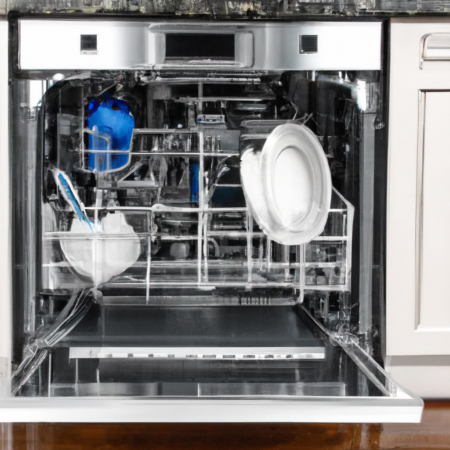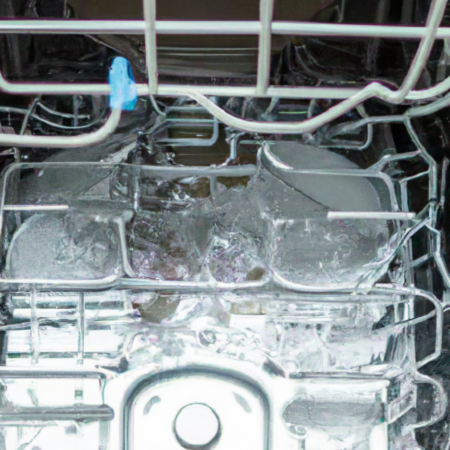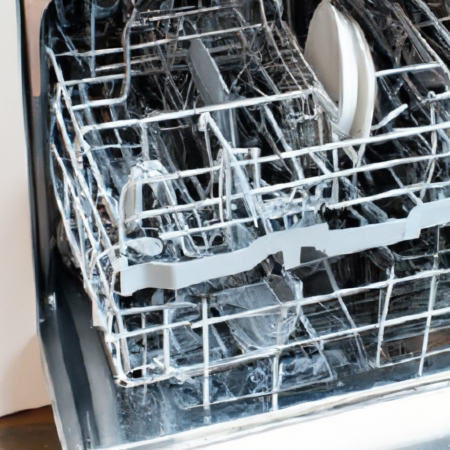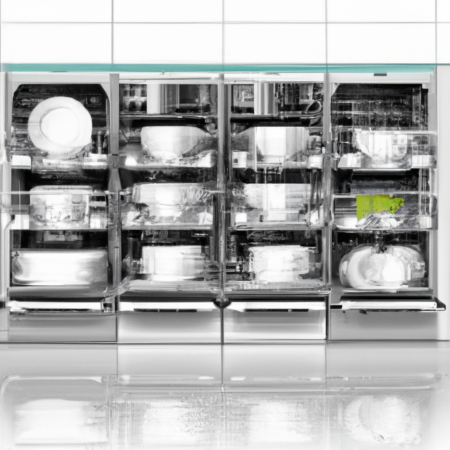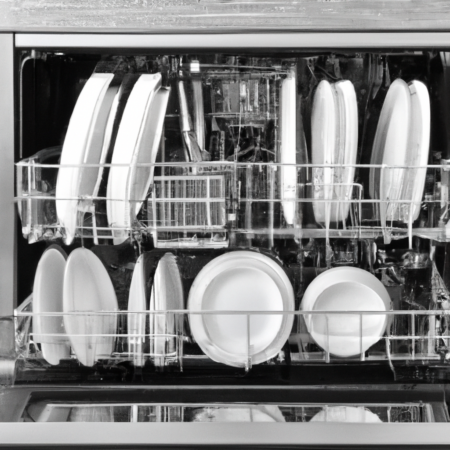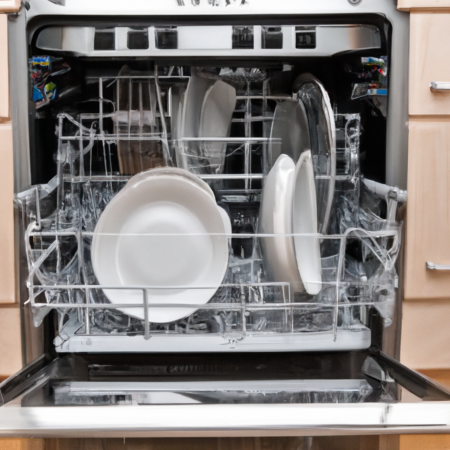We're an affiliate
We hope you love the products we recommend! Just so you know, we may collect a share of sales or other compensation from the links on this page. Thank you if you use our links, we really appreciate it!
Hey, have you ever wondered how often you should replace your dishwasher? It’s an important question to consider, as having a reliable dishwasher can make your life so much easier. In this article, we’ll discuss the factors that can help you determine when it’s time to bid farewell to your old dishwasher and welcome a new one into your kitchen. From the lifespan of a dishwasher to signs of wear and tear, we’ve got you covered. So, let’s dive right in and find out how often you should replace your dishwasher!
Expected Lifespan of a Dishwasher
Average lifespan
When it comes to the expected lifespan of a dishwasher, you can generally expect it to last anywhere from 9 to 15 years. Of course, this estimate can vary depending on a variety of factors, such as the brand, model, usage, and maintenance.
Factors affecting lifespan
Several factors can have a significant impact on the lifespan of your dishwasher. One of the most influential factors is the quality of the dishwasher itself. Higher-end models from reputable brands tend to have a longer lifespan due to their superior build quality and materials.
Additionally, the frequency of use and the intensity of usage can affect the lifespan. A dishwasher that is used heavily and runs multiple cycles every day will generally have a shorter lifespan compared to one that is used sparingly.
Water quality can also play a role in the lifespan of your dishwasher. Hard water, which contains a high mineral content, can lead to mineral buildup within the dishwasher’s internal components over time. This buildup can affect the dishwasher’s performance and ultimately shorten its lifespan.
Lastly, the maintenance and care you provide for the dishwasher can greatly impact its lifespan. Regular cleaning, proper loading techniques, and addressing small issues promptly can help prolong the life of your appliance.
Maintenance and its impact on lifespan
Proper maintenance is key to ensuring the longevity of your dishwasher. By following a few simple steps, you can greatly extend its lifespan.
Regular cleaning is essential to prevent the buildup of residue and mineral deposits. Clean the filters, spray arms, and interior of the dishwasher regularly, and remove any food particles or debris that may be present.
Proper loading is also important to prevent unnecessary strain on the dishwasher’s components. Avoid overloading the dishwasher, as this can lead to poor cleaning performance and potential damage to the racks and wash arms.
Addressing small issues promptly is another crucial aspect of maintenance. If you notice any leaks, unusual noises, or performance issues, it’s important to have them investigated and repaired as soon as possible. Ignoring these issues can lead to further damage and potentially shorten the lifespan of your dishwasher.
Understanding Signs of a Failing Dishwasher
Persistent technical issues
If you find yourself frequently dealing with technical issues with your dishwasher, it may be a sign that it’s nearing the end of its lifespan. Common technical issues include problems with the control panel, malfunctioning sensors, or motor failure. When these issues become persistent and difficult to resolve, it’s worth considering replacing your dishwasher.
Increasing noise levels
Dishwashers do make some noise during operation, but if you notice a significant increase in the noise level, it could be a sign of a failing dishwasher. This could be due to worn-out bearings, faulty motors, or malfunctioning components. If the noise becomes unbearable or disruptive, it may be time to start looking for a new dishwasher.
Water leakage
Water leakage is a serious issue that should never be ignored. If you consistently find water pooling around your dishwasher or notice water seeping out from the bottom, it’s a clear indication of a problem. Leaks can cause damage to your kitchen floor, cabinets, and even the dishwasher itself. Promptly addressing this issue is crucial to prevent further damage and potential safety hazards.
Poor dish cleaning performance
The primary function of a dishwasher is to clean your dishes effectively. If you notice a decline in the cleaning performance of your dishwasher, it may be a sign that it’s approaching the end of its lifespan. This could be due to worn-out spray arms, clogged filters, or a malfunctioning water pump. If the dishwasher consistently fails to clean your dishes properly, it may be more cost-effective to replace it rather than continuing to rely on its diminishing performance.

Cost vs Benefit Analysis for Dishwasher Replacement
Cost of frequent repairs Vs new purchase
When deciding whether to repair or replace your dishwasher, it’s important to consider the cost of frequent repairs versus purchasing a new appliance. While repairing a dishwasher may be a more affordable option in the short term, the cumulative cost of multiple repairs can add up significantly over time.
It’s also worth considering the hassle and inconvenience of frequent repairs. Having to constantly schedule repair appointments, deal with downtime, and potentially incur additional costs for replacement parts can become burdensome. In many cases, replacing the dishwasher altogether can provide a more cost-effective and hassle-free solution.
Energy efficiency of newer models
Another important factor to consider when weighing the cost vs benefit analysis is the energy efficiency of newer dishwasher models. Older dishwashers tend to be less energy-efficient and can consume more water and electricity per cycle compared to their modern counterparts.
By upgrading to a newer, more energy-efficient dishwasher, you can potentially save on your utility bills in the long run. Energy-efficient models are designed to minimize water and energy usage without compromising on cleaning performance, making them a more environmentally friendly and cost-effective choice.
Modern features in newer models
Newer dishwasher models often come equipped with a range of modern features and technologies that can enhance your dishwashing experience. Features such as adjustable racks, specialized wash cycles, soil sensors, and noise reduction technology can greatly improve the functionality and convenience of your dishwasher.
While these features may not directly affect the lifespan of the dishwasher, they can certainly enhance your overall satisfaction and make the investment in a new appliance even more worthwhile.
Environmental Impact of Replacing Your Dishwasher
Disposal of old dishwasher
When replacing your dishwasher, it’s important to consider the environmental impact of disposing of the old appliance. Dishwashers contain various components, including plastic, metal, and electronic parts, which can have a detrimental impact on the environment if not properly recycled or disposed of.
To minimize the environmental impact, check for local recycling programs or contact appliance retailers who may offer recycling services. Proper disposal ensures that the materials are recycled and can be reused in the manufacturing of new products.
Eco-friendly features in new models
On the positive side, newer dishwasher models often come equipped with eco-friendly features that can help reduce water and energy consumption. Many modern dishwashers have eco-friendly wash cycles that use less water and lower temperatures to clean dishes effectively while minimizing environmental impact.
Look for dishwashers with an Energy Star certification, as these appliances meet strict energy efficiency guidelines set by the Environmental Protection Agency. Energy Star certified dishwashers can significantly reduce water and energy usage, helping you minimize your carbon footprint.
Use and waste management
Your dishwasher usage habits can also play a role in the environmental impact of your appliance. To minimize water and energy consumption, be mindful of only running the dishwasher when it’s full, and avoid pre-rinsing dishes unless absolutely necessary.
Proper waste management is another important aspect to consider. Dispose of food waste in the appropriate manner before loading the dishwasher to prevent unnecessary strain on the appliance’s filters and drain system. This can help maintain optimal performance and prolong the lifespan of your dishwasher.

Warranty, Insurance, and Coverage
Length of typical warranties
When purchasing a dishwasher, it’s important to consider the length of the manufacturer’s warranty. The warranty period can vary by brand and model, but most dishwashers come with a standard warranty that covers parts and labor for a specific period of time, typically ranging from 1 to 2 years.
It’s worth noting that some manufacturers offer extended warranties or have options to purchase additional coverage. These extended warranties can provide added peace of mind and financial protection against unexpected repairs or component failures.
Insurance claims for appliance failure
In addition to the manufacturer’s warranty, you may also have coverage through your homeowner’s insurance policy. Some policies offer coverage for appliance failure due to normal wear and tear or mechanical breakdown.
It’s important to review your insurance policy to understand what types of appliance failures are covered and any limitations or exclusions that may apply. This can help you make an informed decision when it comes to repairing or replacing your dishwasher.
Is a home warranty worth it?
A home warranty is a service contract that covers the repair or replacement of major home systems and appliances, including dishwashers. Home warranties can provide added protection beyond the manufacturer’s warranty and may cover repairs or replacements that are not covered by your insurance policy.
Whether a home warranty is worth it depends on your specific circumstances and preferences. If you have older appliances or are concerned about potential repair costs, a home warranty can offer peace of mind and financial protection. However, it’s important to carefully read the terms and conditions of the warranty and consider the cost versus the potential benefits before making a decision.
When to Repair Instead of Replacing
Minor vs major damage
In some cases, repairing your dishwasher may be a more cost-effective solution than replacing it. Minor damage, such as a broken handle, worn-out racks, or a faulty door latch, can usually be repaired without significant expense.
On the other hand, major damage, such as a broken motor, malfunctioning control panel, or structural issues, may warrant replacing the dishwasher, especially if the repair costs are close to or exceed the cost of a new appliance.
Professional diagnostics
If you’re unsure whether to repair or replace your dishwasher, it’s advisable to seek professional diagnostics. Appliance repair technicians can inspect your dishwasher, identify the underlying issues, and provide an estimate for the repairs.
Their expertise and experience can help you make an informed decision based on the severity of the damage, the estimated cost of repairs, and the remaining lifespan of the dishwasher. Sometimes, a professional opinion can provide the clarity needed to make the right choice.
Cost-effectiveness of repairs
The cost-effectiveness of repairs depends on various factors, including the age of the dishwasher, the cost of replacement parts, and the estimated lifespan of the repaired appliance.
If the dishwasher is relatively young and the repair costs are significantly lower than the cost of a new model, opting for repairs may be the more prudent choice. However, if the dishwasher is older and nearing the end of its expected lifespan, investing in repairs may not be the most cost-effective option, as additional issues may arise in the near future.
Choosing a Good Quality Dishwasher
Reviewing top dishwasher brands
When shopping for a new dishwasher, it’s important to consider the reputation and reliability of different brands. Some well-known dishwasher brands include Bosch, KitchenAid, Miele, Samsung, and Whirlpool. These brands are known for their quality, durability, and performance.
Reading customer reviews and consulting with appliance experts can provide valuable insights into the pros and cons of different dishwasher brands. Consider factors such as cleaning performance, noise level, ease of use, and overall customer satisfaction when evaluating different models.
Energy and water efficiency
Energy and water efficiency are key factors to consider when choosing a dishwasher. Look for models that have earned the Energy Star certification, as they meet strict energy efficiency standards. Energy-efficient dishwashers save both energy and water, resulting in lower utility bills and reduced environmental impact.
Pay attention to the dishwasher’s water consumption per cycle and the energy usage ratings, which are usually indicated on the product’s packaging or specifications. Dishwashers with adjustable wash cycles, soil sensors, and water-saving features can further enhance their efficiency.
Ease of use and advanced features
Consider the ease of use and the advanced features offered by different dishwasher models. Look for features such as adjustable racks, multiple wash cycle options, delay start functions, and child lock features. These features can greatly enhance the convenience and functionality of your dishwasher, making your dishwashing experience more enjoyable and efficient.
It’s also worth evaluating the noise level of the dishwasher. Look for models that have noise reduction technology and a low decibel rating. A quiet dishwasher can make a significant difference, especially in open floor plan layouts or if you frequently run the dishwasher overnight.
Installation of a New Dishwasher
DIY installation vs professional services
When it comes to installing a new dishwasher, you have the option of doing it yourself or hiring professional services. While DIY installation may save you money in terms of labor costs, it’s important to consider your level of expertise and the potential risks involved.
Installing a dishwasher involves electrical connections, plumbing, and ensuring proper alignment and securing. If you’re confident in your skills and knowledge, and have experience with similar installations, DIY installation may be a viable option.
However, if you’re unsure or uncomfortable with the installation process, it’s highly recommended to hire professional services. Professional installers have the expertise and experience to ensure a safe and proper installation, minimizing the risk of damage to your home or potential safety hazards.
Expected costs
The cost of dishwasher installation can vary depending on various factors, such as the complexity of the installation, location, and any additional services required, such as electrical or plumbing modifications.
DIY installation can save you on labor costs, but there may be expenses associated with purchasing installation materials and tools. Hiring professional installation services can provide peace of mind, but it will come with an additional cost.
It’s advisable to inquire about installation costs from multiple service providers or consult with a reputable retailer to get a better idea of the expected costs in your area.
Challenges and potential issues
During the installation process, there may be challenges or potential issues that need to be addressed. Some common challenges include aligning the dishwasher properly with the countertop, ensuring a secure connection to the water supply and drain lines, and making the necessary electrical connections.
If you encounter any difficulties during the installation, it’s recommended to seek professional assistance to ensure a proper and safe installation. Proper installation is crucial for the optimal performance and longevity of your dishwasher.
Maintenance Tips to Prolong the Lifespan of Your Dishwasher
Regular cleaning
Regular cleaning is essential to keep your dishwasher in optimal condition. Clean the filters, spray arms, and interior of the dishwasher regularly to prevent the buildup of food particles, residue, and mineral deposits.
Use a dishwasher-safe cleaner or a mixture of vinegar and baking soda to clean the interior. Wipe down the exterior surfaces and control panel with a damp cloth. By keeping your dishwasher clean, you can prevent odors, maintain optimal performance, and prolong its lifespan.
Proper loading
Proper loading techniques can help prevent unnecessary strain on the dishwasher’s components and ensure effective cleaning. Avoid overcrowding the dishwasher and ensure that dishes are placed securely in the racks, without blocking the spray arms or impeding the movement of the water.
Placing utensils in the silverware basket with some spacing between them can prevent them from nesting and ensure thorough cleaning. Larger and heavily soiled items should be placed on the bottom rack, while more delicate items can be placed on the top rack.
Refer to the dishwasher’s user manual for specific loading instructions tailored to your appliance model.
Addressing small issues promptly
Addressing small issues promptly can prevent them from escalating into major problems that may require costly repairs or even the need for a replacement. If you notice any leaks, unusual noises, or poor cleaning performance, it’s important to investigate and address these issues promptly.
Inspect the dishwasher for any visible signs of damage or wear, such as cracked hoses, loose connections, or worn-out gaskets. If you’re unable to resolve the issue yourself, it’s recommended to seek professional assistance to prevent further damage and ensure the longevity of your dishwasher.
Conclusion: Key Factors in Dishwasher Replacement Decision
Lifespan of current model
The expected lifespan of your current dishwasher is an important factor to consider when deciding whether to repair or replace the appliance. If your dishwasher is approaching or exceeding its expected lifespan, it may be more cost-effective to invest in a new model rather than spending money on repairs.
Frequency of repairs
If you find yourself frequently dealing with repairs and technical issues, it may be a sign that your dishwasher is nearing the end of its lifespan. Constant repairs can add up in terms of both cost and inconvenience. Assess the frequency and cost of repairs to determine if it’s more sensible to replace the dishwasher.
Energy efficiency
The energy efficiency of your dishwasher should also be taken into account. Older models tend to be less energy-efficient and may consume more water and energy per cycle. Upgrading to a newer, more energy-efficient model can help you save on utility bills and reduce your environmental impact.
Cost of new model
Evaluate the cost of purchasing a new dishwasher and compare it to the potential cost of repairs. If the cost of repairs is close to or exceeds the cost of a new appliance, it may be more financially advantageous to invest in a new model. Additionally, consider the long-term cost savings associated with energy-efficient models.
Considering these key factors and weighing the pros and cons of repair versus replacement will help you make an informed decision that suits your needs, budget, and long-term goals for your dishwasher. Remember to prioritize proper maintenance to maximize the lifespan of your dishwasher, regardless of your ultimate decision.


